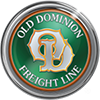How Does LTL Pricing Work? What to Discuss With Your Carrier
Before you choose to ship with any freight carrier, it’s important to figure out your freight costs and understand the elements that make up your invoice. Ensuring you take these elements into consideration before requesting a quote or filling out a Bill of Lading will save you time, money, and stress.
How to Get the Most Accurate LTL Rates
When shipping with OD, it’s best to work with one of our Solutions Specialists to set up a shipping account. This not only provides you with personalized support, but also access to competitive rates tailored to the shipping lanes your business uses as well as credit terms.
Carriers typically need the following information to provide accurate LTL pricing estimates:
- Shipment Weight – When requesting a quote, it is important to provide the accurate total weight of an individual handling unit or shipment (when tendering multiple handling units) to prevent discrepancies between the freight estimate and invoice. This includes not only the weight of the item you are shipping, but also the packaging and pallet weight. OD reweighs shipments as they move through the network for load planning, and invoices the shipment based on the total weight measured. We recommend checking your weighing tools for accuracy and scheduling routine calibrations for your scales.
- Shipment Dimensions – By providing the total shipment weight and dimensions, i.e., length, width, and height, OD can calculate the density of the shipment to ensure the correct freight class is being applied. When shippers provide this information accurately it makes variances less likely in your freight costs. OD, and many other carriers, have an accessorial charge for overlength articles beyond standard pallet dimensions.
- Freight Class – Freight classes, also known as National Motor Freight Classification (NMFC) codes, are the LTL’s industry standard. The National Motor Freight Traffic Association (NMFTA) is responsible for updating and maintaining the NMFC, which changes throughout the year. The NMFTA bases classes on an evaluation of the commodities’ characteristics, which includes density, handling, stowability, and liability. The best way to stay up to date with freight class is by purchasing access to NMFTA’s ClassIT system. It is vital that you know your commodity’s accurate freight class as it is one of the key factors in calculating your estimated freight costs.
- Origin and Destination Zip Codes – When you request a freight quote, carriers require the city and zip code for both the origin and destination of the shipment. This information allows the carrier to calculate the number of transit miles and the shipping lane where the freight is moving.
- Accessorial Services – Accessorial Services are necessary for OD to properly and safely pickup or deliver a shipment. Common accessorials include liftgate at pickup/delivery, hazardous material, residential delivery, appointment required, and overlength freight. These services ensure that OD will have the right equipment, such as a lift gate, when delivering to a residence. Knowing the services you require and informing OD of your needs when requesting a freight quote ensures the rate will match the amount on the invoice for the shipment.
- Required Transit Time – If you have time-sensitive shipments that need to be delivered faster than the standard transit time or even during a time-specific delivery window, OD offers Expedited LTL shipping options. Expedited shipping is more labor intensive with additional oversight and requires a different process to schedule at an additional charge. When requesting a freight rate, it is important to alert OD of a shipment’s urgent transit-time needs so the expedited service can be applied.
Typical Freight Shipping Costs
- Subtotal – A subtotal, also known as line haul charges, reflects an LTL carrier’s base rate along with the specific variables of the shipment (total weight, freight class, and number of transit miles). Discounts can be applied to your subtotal and depend on various factors.
- Fuel Surcharge – Fuel Surcharge is a separate part of your LTL bill that helps cover the cost of transporting your freight. It is not the same as an accessorial. Once the subtotal has been calculated, LTL carriers multiply the applicable fuel surcharge percentage to the net shipment subtotal. This price is based on the real-time cost of diesel fuel. The Fuel Surcharge is determined by the U.S. Energy Information Administration (EIA) and changes weekly. OD publishes Fuel Surcharge updates every Wednesday.
- Accessorial Charges – These are the fees for any additional services required during transit, or at pickup and/or delivery. Requirements such as “liftgate at delivery,” “protect from freezing,” or “overlength article” are a few examples of common additional services or rules that have an additional fee. OD publishes these charges in our ODFL 100 Tariff.
Our customers choose Old Dominion for our premium service and one of the lowest claims rates in the industry. Our team can help you access competitive LTL pricing tailored to your needs and ensure your freight arrives on-time and is damage-free. Connect with a Solutions Specialist today.
